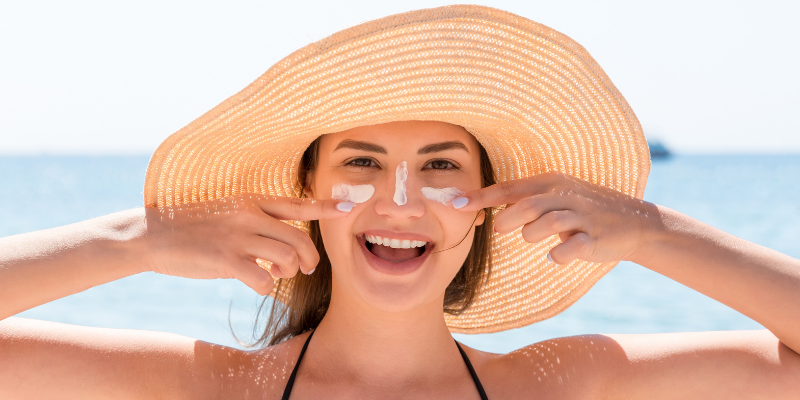Is Tinted Sunscreen Better than Untinted Sunscreen?

As their name suggests, tinted sunscreens offer the added benefit of imparting a natural-looking tint and glow to your skin — but that’s not all they can do! Unlike untinted SPF, tinted sunscreens offer both UV and blue light protection, keeping your skin smooth and healthy whether you are outdoors or in front of your computer screen. For this reason, tinted sunscreen does offer better protection than their untinted counterparts.
Still not convinced? Read on to learn more about what tinted sunscreen is, how it can benefit your skin, and tips for getting the most out of your tinted SPF.
What Is Tinted Sunscreen?
Tinted sunscreen contains iron oxides like zinc oxide and titanium dioxide, which are mineral particles that have been shown to block not only UV light, but also blue light emitted from computer and cellphone screens. However, mineral-based sunscreens of the past left a chalky white film on the skin — think of a lifeguard with the characteristic white spot on his nose. To remedy this, today’s mineral-based sunscreens also contain added pigments in a range of shades. The result is tinted sunscreen, available in nearly every shade under the sun.
However, do not be fooled by foundations that contain SPF, as these are not the same as a tinted sunscreen. Foundations and other cosmetic products that have added SPF are not effective enough to be used in place of sunscreen and should instead be used in addition to a stand-alone SPF like a tinted sunscreen. You can read more about why makeups and moisturizers that contain SPF are not effective on their own in my dedicated guide.
Benefits of Tinted Sunscreen
As noted above, the biggest benefit of using tinted sunscreen vs. regular sunscreen is that tinted sunscreens offer both UV and blue light protection for your skin. Even short-term exposure to blue light has been shown to cause oxidative stress on your skin, which can result in premature wrinkles, dark spots, and other signs of skin aging. Thus, using a daily iron oxide sunscreen can help to prevent signs of premature aging caused by both sun exposure and exposure to blue light.
Additionally, tinted sunscreens offer a light, non-greasy base color to your skin, helping to smooth away minor imperfections or blemishes. In fact, tinted sunscreens can be used in place of a regular foundation to achieve a natural-looking glow without needing to apply heavy makeup. If you still prefer to use a foundation and SPF, however, tinted sunscreens are generally light enough that they can be layered on top of makeup without leaving a greasy residue.
How to Use Tinted Sunscreen
The most important tip to remember when using a tinted sunscreen (or any SPF!) is that you need to use at least a ½ teaspoon of SPF to cover your face. Then, you can layer more tinted SPF on top of this to achieve a slightly darker shade if you like.
Secondly, be sure to choose a tinted sunscreen that is a good match for your Baumann Skin Type. If you have oily skin, for example, look for a lighter-weight SPF that won’t clog pores or contribute to shininess. Dry skin types should look for SPFs that contain hydrating ingredients to avoid a cracked or cakey look.
Finally, choose a tinted sunscreen that you like and will therefore be inclined to use every day. If you prefer a matte finish, for example, there are many tinted matte SPFs available. Similarly, tinted sunscreens come in sticks, lotions, and sprays, so choose your preferred type so that you will like using it.
Bottom Line
The iron oxides found in tinted sunscreens block both UV and blue light, making them more effective than untinted SPF at protecting your skin indoors and outdoors. As an added bonus, tinted sunscreens also add a light touch of color to your skin and can be used with or without regular foundation.
Most importantly, whether you decide to give tinted sunscreen a try or not, be sure to wear SPF on a daily basis to not only keep lines and wrinkles at bay but to also reduce your risk of developing skin cancer.


